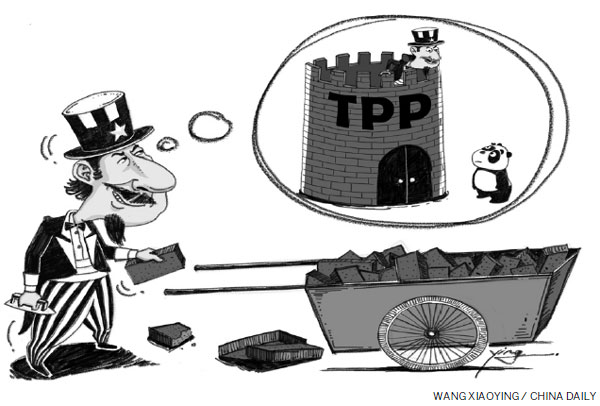Future TPP deal no threat for China's economy
Updated: 2015-08-08 07:37
By Zhao Jianglin(China Daily)
|
||||||||

The United States and 11 other economies negotiating the Trans-Pacific Partnership agreement will continue to try and resolve outstanding issues, including intellectual property rights and liberalization of dairy product and auto tariffs, which they could not solve even after intense discussions at the ministerial level in Hawaii late last month.
Just one month ago, US President Barack Obama moved one step closer to finalizing the TPP after signing into law a bill on June 29 that gave him "fast-track" power to push ahead the Pacific Rim trade deal. Although US Secretary of State John Kerry insisted on Tuesday that all the TPP negotiators are "nearing completion" of a landmark agreement, it is too early to say what the future holds for the free-trade pact among the 12 economies that together account for about 40 percent of the world economy.
The biggest challenge for the parties negotiating the TPP remains the conflict over sharing of dividends, which suggests the agreement may be too "advanced" for some of the economies that have to radically change their trade policies. Japan, for example, is reluctant to allow more rice imports from the US, yet it hopes to increase the exports of Japanese cars to the US. The TPP also requires less developed economies like Vietnam to follow higher labor and environment standards.
The fact is, if the TPP isn't ratified by the end of this year, it is not likely to be before Obama leaves office. Since the day it proposed the TPP, the US has been divided between proponents like Obama's fellow Democrats and opponents such as American trade unions and independent observers. And the ensuing arguments over the TPP's pros and cons have stalled it from being finalized.
Admittedly, the trade pact has the potential to reinforce the US' leading role in global investment and trade. But opponents in the US have a convenient excuse to filibuster the deal, saying it will deal a blow to employment in the country. The unspoken truth is that the US Congress is unwilling to see the success of the TPP deal becoming a legacy of Obama.
Given that Washington is seeking to secure its interests, old and new, as well as its leadership in the global economy, the following could happen if the TPP negotiations are not finalized during Obama's presidency.
First, the US might miss the "perfect" time to reshape the Asia-Pacific economy, which is undergoing drastic changes because of the rise of developing powers like China and India. To maintain their leading role in the global economy, advanced economies such as the US will have to better adapt to the new trade regulations and changing economic reality. But the deadlock over the TPP is likely to prevent the US from doing so, dealing a blow to its "rebalance to Asia" strategy.
Also, the failure to finalize the TPP may hinder Washington's attempts to integrate deeper with the global economy, and undermine its economic strength and strategic presence across the globe. To some extent, the TPP aims to boost some advanced industries in the US and cure some of the ills resulting from the 2008 global financial crisis. That, too, will have to wait.
There are more than one transnational cooperation agreements in the Asia-Pacific, which include the Regional Comprehensive Economic Partnership, proposed by the Association of Southeast Asian Nations, and the China-led Asian Infrastructure Investment Bank. Yet they will not necessarily benefit from the setback to the TPP, because they are designed to play different roles.
The main aim of the 16-nation RCEP is to guarantee free and convenient trade and investment among all its members, but it is possible only if the existing gaps over tariff elimination targets are bridged.
China, despite being excluded from the TPP negotiations, is not sitting idle. The high-level free trade agreements it finalized with the Republic of Korea and Australia last year will eventually help it meet trade conditions, including those of the TPP. And even if the economies negotiating the TPP eventually seal a deal without China, the country is confident of minimizing the risk that the US-led agreement could pose to its economy.
The author is a researcher in economics at the National Institute of International Strategy, affiliated to the Chinese Academy of Social Sciences.
(China Daily 08/08/2015 page5)
- Global health entering new era: WHO chief
- Brazil's planning minister steps aside after recordings revelation
- Vietnam, US adopt joint statement on advancing comprehensive partnership
- European border closures 'inhumane': UN refugee agency
- Japan's foreign minister calls A-bombings extremely regrettable
- Fukushima impact unprecedented for oceans: US expert

 Stars of Lijiang River: Elderly brothers with white beards
Stars of Lijiang River: Elderly brothers with white beards
 Wealthy Chinese children paying money to learn British manners
Wealthy Chinese children paying money to learn British manners
 Military-style wedding: Fighter jets, grooms in dashing uniforms
Military-style wedding: Fighter jets, grooms in dashing uniforms
 Striking photos around the world: May 16 - May 22
Striking photos around the world: May 16 - May 22
 Robots help elderly in nursing home in east China
Robots help elderly in nursing home in east China
 Hanging in the air: Chongqing holds rescue drill
Hanging in the air: Chongqing holds rescue drill
 2.1-ton tofu finishes in two hours in central China
2.1-ton tofu finishes in two hours in central China
 Six things you may not know about Grain Buds
Six things you may not know about Grain Buds
Most Viewed
Editor's Picks

|

|

|

|

|

|
Today's Top News
Liang avoids jail in shooting death
China's finance minister addresses ratings downgrade
Duke alumni visit Chinese Embassy
Marriott unlikely to top Anbang offer for Starwood: Observers
Chinese biopharma debuts on Nasdaq
What ends Jeb Bush's White House hopes
Investigation for Nicolas's campaign
Will US-ASEAN meeting be good for region?
US Weekly

|

|









